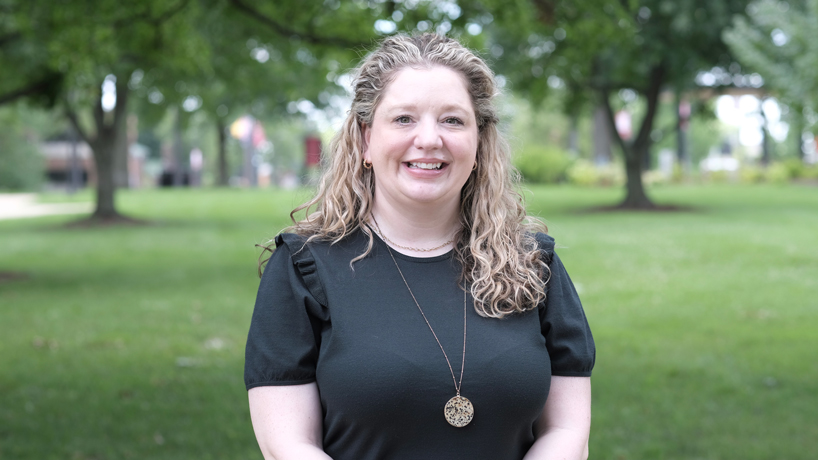
Associate Provost Amber Reinhart recently spoke to St. Louis Public Radio health reporter Sarah Fentem about how to try to persuade family members and friends reluctant to get a COVID-19 vaccine. (Photo by August Jennewein)
Americans adults have had access to free COVID-19 vaccines since the spring, but many remain reluctant to get a shot.
Counting children under 12, who are still not eligible, only about two-thirds of the U.S. population has received at least one dose. In states such as Missouri, vaccination rates are even lower – only 54.7% of residents have received one dose and only 48.8% are fully vaccinated, according to data from the Missouri Department of Health & Senior Services.
Not only has that left public health officials struggling to overcome vaccine hesitancy, but it’s led to family rifts as vaccinated people try, often unsuccessfully, to persuade their relatives to get their shots.
University of Missouri–St. Louis Associate Provost Amber Reinhart, an associate professor in the Department of Communication and Media, specializes in health communication and has worked on messaging around organ donation and ways to increase healthy behaviors while decreasing unhealthy ones. St. Louis Public Radio health reporter Sarah Fentem recently spoke to Reinhart about whether persuasion is even possible.
“I think the first thing is where they fall on that continuum of hesitancy,” Reinhart told Fentem in an interview published on Monday. “So I would say at one end of the continuum, you have people who were all about getting the vaccination; they ran out, they got it right away. On the other side of the continuum, we have people who say, I’m never getting vaccinated, and they’re staunchly against it. And I would say, if they’re on that end of the continuum, it’s really hard.
“But then you have people somewhere in the middle, and that’s what we call a vaccine hesitant. And I feel like if you have any kind of hesitancy, where it’s not a fierce, ‘no, never,’ there’s more hope for you to make a change than if somebody is just way far over on the other end.”
Breaking through can require overcoming a lot misinformation that exists about vaccines and their safety or effectiveness.
“I think what we’re finding a lot with misinformation is I can find a source to prove you wrong, and you can find a source to prove me wrong,” Reinhart said. “And we can just play that game ad nauseam.
“But if I were to say to you: “As your grandmother, I care about you, I’m more worried about you getting ill, I want you to be with the family for Christmas, we all want to be together,” those types of things, I think, play a lot better. I think you want to get to the root of why that’s a fear for them.”
To listen to complete interview between Reinhart and Fentem, click here.














